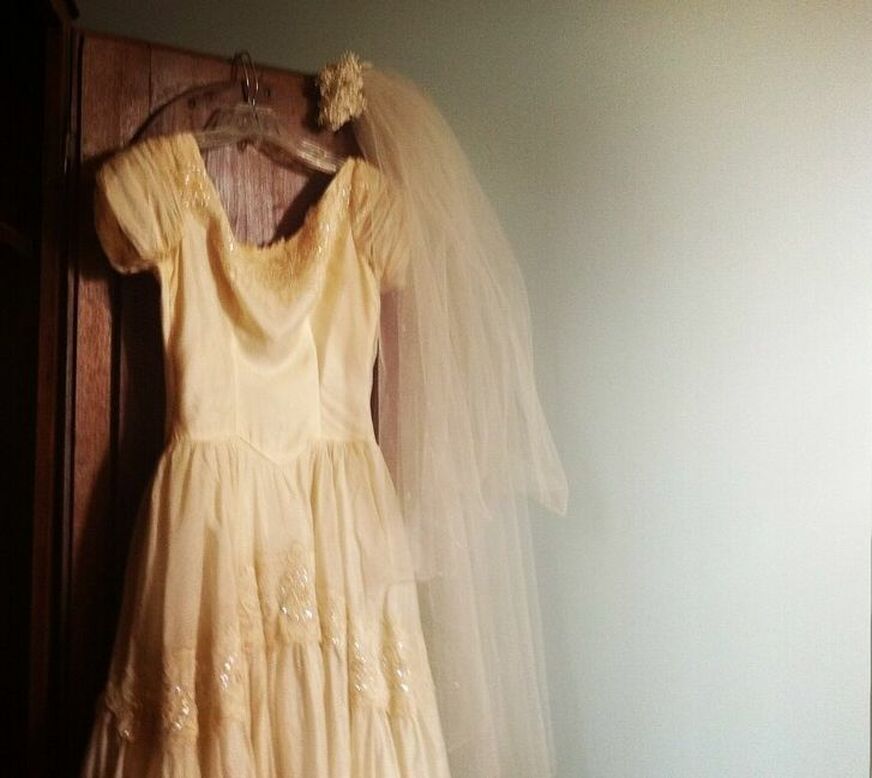|
Memphis CVB CC GRIEF, REHAB AND A WEDDING DRESS The dress was intended for another wedding to another groom. Days before those nuptials, he backed out. He moved on, and a few years later, my cousin did the same. She found love again, and another man to marry. The dress had the ultimate revival, thanks to my mother. At first, it was just a plain white satin gown, but my mother saw more. She redesigned it; tearing it apart and putting it back together with assistance from my Aunt Annie. My mother, without a sketchpad, ripped apart the neckline and back, then added organza over the white satin and hundreds of white pearls. She enhanced the sleeves with ruching and five tiny rose buds, each topped off with a miniature pearl. She cut a “V” into the back and filled the space with lace. My mother spent weeks away from home, away from her family in Maryland, working on that dress, turning satin into roses. It was a blessing that she had the gown to focus on. As a recovering alcoholic, just months out of rehab, we wanted the dress in her hands to keep her from reaching for a glass of Hennessey, her preferred alcoholic beverage. I come from a family of addicts. We’ve got it all covered – alcohol, drugs, sex, gambling and food. We excel at excess. We drink too much, eat too much, we all do something too much. Shopping too much is my demon, my tormentor, my hell. My mother was a stunningly beautiful woman, charming, gregarious and generous, but she was a sloppy and mean drunk. I loved and worshipped my mother. As a little girl I wanted to be her, and as an adult I tried to emulate her, falling painfully short, never able to capture her beauty and personality that dominated any room she entered or her generosity. She wasn’t always a drunk, but once she picked up the habit she quickly accelerated from occasional over indulger to functioning alcoholic. Suddenly, my once thoughtful doting mother only seemed to care about one thing: her next drink. So many special memories are soiled by her behavior. Twenty-four hours after my high school graduation she was still celebrating. The stale stench from hours of non-stop partying clung to her breath. She was sipping on a glass of Hennessy, saying how proud she was of me. It was 9:30 in the morning. My head was throbbing. We had a beer keg at the party, and I had consumed too much. The smell of liquor and the sight of my mother made me want to puke. Instead, I ran down the stairs to the dining room and grabbed a bottle of alcohol, carrying it into the kitchen, and emptied the contents down the drain. I grabbed another bottle and another bottle and another bottle and another and drained them all. My other stumbled down the stairs and discovered me pouring out the liquor bottles. She yanked my arm and asked, “What are you doing?” I ignored her. She repeated the question, and I continued to empty the bottles. She slapped my face before teetering back up the stairs. Several hours later, she apologized, but my mother kept drinking for at least 15 more years. My father battled a different dependency: gambling. He loved shooting dice, but by the time I was born he had buried the habit. He rarely shared that aspect of his life, and when he did it seemed to me he was discussing a stranger; some relative who died long before I was born, but one that he wanted his family to know and remember. The stranger blew his paychecks to feed his habit. He loved the wild ride of the back-alley games – the thrill that came with winning and the fights, usually started by him – that came with losing. Years, later my father could visit racetracks and casinos without even being tempted to bet. Yet, with just a few exceptions, addictions, at least in my family, seldom ended well. My maternal grandfather suffered from dementia after too many blows to the head during drunken brawls. My paternal grandparents died at the hands of a drunk driver, their son. In comparison, my addiction to shopping seemed harmless. I could hide my injuries, and there were plenty, under my pretty cloths. Clothes are magical. They protect me, shielding me from the harsh judgments of others. Sometimes, you wonder if they know what others do not. That years ago, while stuck in a hot car with your favorite cousin, while your mother shopped at McBrides, a now defunct low-end discount chain, he says something that injures you, and the wound never heals. You were a smart-mouthed seven-year old. Maybe you called him stupid. Maybe you said you hated him because he refused to disobey your mother’s order and let you leave the car. He said: “You’re ugly, black, skinny and baldheaded and no one will ever love you.” His words crack a piece of your heart. But with the right outfit you can hide your flaws and fool everyone. It works so well that you can even fool yourself and bury your cousin’s hurtful words. So, you shop and over spend; shop and over spend just to keep up the charade because without the clothes or new shoes, everyone will know your secret. That your cousin spoke the truth all those years ago. I don’t remember the names of some of the places I shopped, or the items purchased. Sometimes, sorting through clothes, I stumbled upon forgotten items with the price tag still attached with no memory of the actual purchase. They were like cheap and random one-night stands, only instead of waking up in bed next to a stranger’s face, there’s an odd piece of clothing in my closet or dresser drawer. My mother prayed to stop drinking. My father prayed to cure his gambling habit, but God seemed to be ignoring my prayers. There was always a sale luring me into a store or an outfit or shoes that I just had to have, with a 50 percent discount that was just too good of a deal. Either one or both would make me whole, fit to present to the world. Somehow, I don’t remember why, but I became convinced that the key to my recovery was tied to my cousin’s wedding dress. All those years ago, at my cousin’s wedding, I simply thought of it as a beautiful dress. No surprise, Mama always made things beautiful and wedding gowns were her specialty. Brides-to-be came to her. She never asked what they wanted, and surprisingly, they obediently wore whatever she created for them. She never charged a fee for making those gowns, but instead, requested a wedding invitation. Photographs of those wedding dresses covered the walls of my parents’ dining room. My cousin had been married for more than 10 years, and my mother dead for less than a year. I was grieving and aching for her, so much of what we shared was connected to clothes and fashion. Her clothes and the clothes she made for me, became a source of comfort. They seemed to have signs of life: pieces of hard candy in the pocket of a sweatshirt, tissues in her winter coat, and old receipts in a leather jacket. I wanted to see that dress. I needed to see that dress. I wondered if it would help me. Could it save me, the way it saved my mother? Could it busy my brain, and stop me from shopping, and over spending? As my Aunt Annie pulled the dress from the garment bag, it was as if I was seeing it for the first time. It was frayed and much of the once-white satin had yellowed, but it was still magical, all those tiny pearls still shining. Two lives resided in that wedding dress. The one my cousin might have had with the fiancé who opted out, and the life she made with her husband and their son. My life was not what I wanted it to be, but I have ripped it apart and remade it, again, and again. The urge to shop is always with me. There’s always a beautiful dress in a store window that I desire, a pair of shoes that I must have; resisting the impulse to shop is a daily struggle. Yet, I have learned how to walk away, no matter how deep the discount, the cost to me is inevitably much more than the price tag. Occasionally, I set goals: Don’t buy anything new, not even lipstick, for a month, two months, three months or six months. I don’t always succeed. It’s slow and tedious, but every day gets a little better. It has been years since I traveled to Virginia to see the dress. I have stumbled. I have relapsed, but every day I picture that wedding dress and start anew knowing that my life, is mine to design and remake as needed.  Constance Johnson is an award-wining writer based in New York City. Her work has appeared in Essence, People, The Wall Street, The Washington Post, and on ABC News among other media outlets. She is currently seeking essays for an anthology, Wise Men: Black Women on Lessons from their Fathers. Comments are closed.
|
AuthorWrite something about yourself. No need to be fancy, just an overview. Archives
April 2024
Categories |

 RSS Feed
RSS Feed
